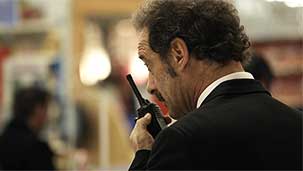There’s a way people talk, and a way people think people talk. You know this as well as anyone. Film dialogue, in particular, is almost always polished and purposeful, explaining plot points and character development. And that’s fine. Movies are wish fulfilment – of course we want to see people say the right thing at the right time. But when a movie like The Measure of a Man comes along, full of stumbles, mumbles, cross-talk, and natural long pauses (none of which are played for laughs), the familiar sting of reality nearly knocked me to the floor.
So here I am, recommending a film based in large part on the unpolished dialogue. It’s probably not a compliment you’re used to hearing.
It didn’t take long for the film’s unconventional rhythm to draw me in. Visually, the film never calls attention to its long take point-of-view shooting style, opting for a cinema vérité perspective rather than the Emmanuel Lubezki àla mode floating God approach. This enhances the tension between the pauses, with director Stéphane Brizé never succumbing to the pressure of clipping a scene. And yet instead of feeling drawn out, we get drawn into each dilemma that our unsuspecting hero faces.
Before seeing the film, I knew Thierry Taugourdeau won the Best Actor prize at the Cannes Film festival for his performance, but that only made me more surprised at how it was completely free of the fireworks that plague showy “Oscar bait” roles. Instead, there’s a quiet dignity to every word he says, and a careful silence that suggests a thousand more unspoken thoughts. He’s a simple blue collar worker looking for new employment in France, suffering the indignity of Skype interviews, career counselling, and positions beneath his experience. He manages to bottle up all of his resentment somehow, and leaves it to the viewer to articulate what makes each moment so distressing.
The reason, however, that I think your loose approach to dialogue editing is so effective is the broad strokes in the picture editing. Transition and establishing shots are almost non-existent, and Taugourdeau’s character is suddenly in a new job or new dilemma without any warning. As an audience we are simply asked to keep up, the same way his character is often overwhelmed by the new pressures and responsibilities he faces. It’s simple and genius, and a reflection of the film as a whole.
I know I’ll keep talking about it.
Sincerely,

Christopher







